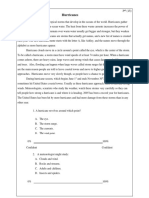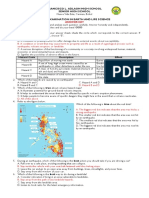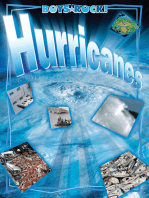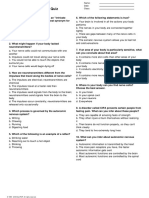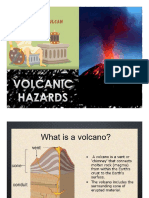100%(1)100% found this document useful (1 vote)
2K viewsHurricanes Quiz
Hurricanes Quiz
Uploaded by
api-368213959Hurricanes Quiz is a 10 question multiple choice quiz about hurricanes. The questions cover topics such as the definition of a hurricane, categories of hurricanes, areas affected by hurricanes and typhoons, meteorological measurements of hurricanes, and weather patterns associated with hurricanes. The quiz assesses understanding of basic hurricane science terminology and impacts.
Copyright:
© All Rights Reserved
Available Formats
Download as PDF, TXT or read online from Scribd
Hurricanes Quiz
Hurricanes Quiz
Uploaded by
api-368213959100%(1)100% found this document useful (1 vote)
2K views1 pageHurricanes Quiz is a 10 question multiple choice quiz about hurricanes. The questions cover topics such as the definition of a hurricane, categories of hurricanes, areas affected by hurricanes and typhoons, meteorological measurements of hurricanes, and weather patterns associated with hurricanes. The quiz assesses understanding of basic hurricane science terminology and impacts.
Original Title
hurricanes quiz
Copyright
© © All Rights Reserved
Available Formats
PDF, TXT or read online from Scribd
Share this document
Did you find this document useful?
Is this content inappropriate?
Hurricanes Quiz is a 10 question multiple choice quiz about hurricanes. The questions cover topics such as the definition of a hurricane, categories of hurricanes, areas affected by hurricanes and typhoons, meteorological measurements of hurricanes, and weather patterns associated with hurricanes. The quiz assesses understanding of basic hurricane science terminology and impacts.
Copyright:
© All Rights Reserved
Available Formats
Download as PDF, TXT or read online from Scribd
Download as pdf or txt
100%(1)100% found this document useful (1 vote)
2K views1 pageHurricanes Quiz
Hurricanes Quiz
Uploaded by
api-368213959Hurricanes Quiz is a 10 question multiple choice quiz about hurricanes. The questions cover topics such as the definition of a hurricane, categories of hurricanes, areas affected by hurricanes and typhoons, meteorological measurements of hurricanes, and weather patterns associated with hurricanes. The quiz assesses understanding of basic hurricane science terminology and impacts.
Copyright:
© All Rights Reserved
Available Formats
Download as PDF, TXT or read online from Scribd
Download as pdf or txt
You are on page 1of 1
Name:
Hurricanes Quiz Date:
Class:
1. Which of the following is a true statement about 6. Which country would most likely be affected by
hurricanes? a typhoon?
a. They only affect tropical areas a. The United States
b. They cannot be measured on any scientific scale b. Japan
c. Their winds are always above 74 miles per hour c. Spain
d. They cause more deaths every year than tornadoes d. Brazil
and earthquakes
7. What can you infer about low and high-pressure
2. Which word best describes the eye of a air masses from the movie?
hurricane? a. Low pressure systems are associated with stormy
a. Tranquil weather
b. Stormy b. High pressure systems are associated with cyclones
c. Windy c. Low and high pressure systems must meet to form
d. Cold a hurricane
d. Low pressure systems are associated with the
3. If a hurricane destroyed an entire U.S. city, what
Southern Hemisphere
category would it most likely be?
a. Category 1 or 2 8. Which device do meteorologists use to predict
b. Category A or B where hurricanes will land?
c. Category X or Y a. b.
d. Category 4 or 5
4. In which U.S. state would a hurricane most
likely strike?
c. d.
a. b.
c. d. 9. What happens immediately after a hurricane
makes landfall?
a. It gets stronger
b. It gets weaker
c. Its winds pick up speed
5. How are tropical storms in the Northern
d. It starts hailing
Hemisphere different from tropical storms in the
Southern Hemisphere? 10. If you heard a hurricane warning announced
a. The winds spin faster in the Southern Hemisphere over the radio, what would it mean?
b. Tropical storms cause more rain in the Southern a. A tropical storm at sea has been upgraded to a
Hemisphere hurricane
c. Tropical storms don't turn into hurricanes in the b. A big hurricane is projected to hit land within 12
Southern Hemisphere hours
d. The winds spin in opposite directions c. A small hurricane has been upgraded to a strong
hurricane
d. A big hurricane is projected to hit land within 36
hours
You might also like
- Nordex N90: Technical DescriptionDocument8 pagesNordex N90: Technical Descriptionwanghs660No ratings yet
- Pre Test 2nd Quarter g8 Science 20212022Document2 pagesPre Test 2nd Quarter g8 Science 20212022RAYMUND RODILLO100% (7)
- 1st Long Quiz in DRRR 2nd SemDocument2 pages1st Long Quiz in DRRR 2nd SemChristine Apolo100% (3)
- Science 8 - 2nd Grading 2019Document3 pagesScience 8 - 2nd Grading 2019Charlyn Divinagracia VelascoNo ratings yet
- 2nd Quarter Test in Science 8Document5 pages2nd Quarter Test in Science 8Maitem Stephanie GalosNo ratings yet
- Grade 8 2nd PeriodicalsDocument3 pagesGrade 8 2nd PeriodicalsSalve Gregorio Aguirre100% (4)
- Substance Abuse QuizDocument1 pageSubstance Abuse Quizapi-368213959No ratings yet
- Substance Abuse QuizDocument1 pageSubstance Abuse Quizapi-368213959No ratings yet
- Hurricanes QuizDocument1 pageHurricanes Quizapi-368213959No ratings yet
- Nat Dis QuizDocument1 pageNat Dis Quizapi-368213959No ratings yet
- DRRR Pre-FinalsDocument2 pagesDRRR Pre-FinalsPrecious GregorioNo ratings yet
- 2nd QTR EXAm SCI 8Document6 pages2nd QTR EXAm SCI 8Benson CornejaNo ratings yet
- TYPHOONSDocument2 pagesTYPHOONSJessie Gainsan100% (2)
- Second Quarter Examination in Science 8Document4 pagesSecond Quarter Examination in Science 8VIMSON ALASTRANo ratings yet
- Category 6 Hurricanes MDocument2 pagesCategory 6 Hurricanes MRex NguyenNo ratings yet
- S CIEDocument2 pagesS CIEAldemar Masambay Ytac CuatonNo ratings yet
- Science 8 2nd PTDocument3 pagesScience 8 2nd PTRalph Nelvin CabosNo ratings yet
- 2Q ST2 Science-8Document6 pages2Q ST2 Science-8missaizcabatinganNo ratings yet
- Second Peridical Test in Science 8Document1 pageSecond Peridical Test in Science 827482019No ratings yet
- Mil Questionnaire 2ND Quarter 2023Document4 pagesMil Questionnaire 2ND Quarter 202325princeperezNo ratings yet
- QUIZ 4-QUIZ 7 TYPHOONDocument2 pagesQUIZ 4-QUIZ 7 TYPHOONericka mae tizonNo ratings yet
- 2Q ST Science-8Document4 pages2Q ST Science-8missaizcabatinganNo ratings yet
- Science 8 Second QRTR Summative TestDocument5 pagesScience 8 Second QRTR Summative Testian barcenaNo ratings yet
- Science Q2 ReviewerDocument4 pagesScience Q2 ReviewerRexsonivan ParisNo ratings yet
- Pre-Test Ls2: Science Direction: Encircle The Letter of The Correct AnswerDocument1 pagePre-Test Ls2: Science Direction: Encircle The Letter of The Correct AnswerShira Joy Overa100% (1)
- S8 - Q2 - Answer Key 3Document4 pagesS8 - Q2 - Answer Key 3psyrillejosephhurtadaNo ratings yet
- Unit Test II. Earth and Life ScienceDocument3 pagesUnit Test II. Earth and Life Sciencerezamae89No ratings yet
- Grade 8 - ST 2 - ANSWER KEYDocument4 pagesGrade 8 - ST 2 - ANSWER KEYmissaizcabatinganNo ratings yet
- Second Quarter Assessment Grade-8 ScienceDocument4 pagesSecond Quarter Assessment Grade-8 ScienceJingjingAloComendador100% (1)
- Reading Comprehension 06 (Beginner Level)Document1 pageReading Comprehension 06 (Beginner Level)David SandersNo ratings yet
- One On One Oral 2nd QuarterDocument5 pagesOne On One Oral 2nd QuarterTirzah Mae PiodenaNo ratings yet
- ST-Science Q2 (W5-6)Document2 pagesST-Science Q2 (W5-6)Reneath QuerubinNo ratings yet
- Science Exam 5Document2 pagesScience Exam 5Jeyxa Keizz Viernes-Apostol BalanayNo ratings yet
- Hurricanes: D. Wind PointDocument2 pagesHurricanes: D. Wind PointNour MohamedNo ratings yet
- Fourthperiodicaltest DRRR 211125115444Document8 pagesFourthperiodicaltest DRRR 211125115444Bela RilloNo ratings yet
- Long Test 2 - Science 8: Multiple Choice. Write The Letter of Your AnswerDocument3 pagesLong Test 2 - Science 8: Multiple Choice. Write The Letter of Your Answerkatherine corvera100% (9)
- 2ND Quarter Exam Science 8Document3 pages2ND Quarter Exam Science 8Reyna Myra Estrada100% (2)
- Diagnostic Test TyphoonDocument1 pageDiagnostic Test TyphoonAlrei Mea100% (1)
- Summative Test On TyphoonDocument1 pageSummative Test On TyphoonJoh A Nna100% (2)
- Filipino ScriptDocument1 pageFilipino ScriptaustineqtieNo ratings yet
- Q4 Summ 2Document2 pagesQ4 Summ 2Jhonazel SandovalNo ratings yet
- 3rd Summative Test in DRRRDocument2 pages3rd Summative Test in DRRRmirah blanca benzulanoNo ratings yet
- G8 Quiz - TYPHOONDocument4 pagesG8 Quiz - TYPHOONlil pony ssiNo ratings yet
- Earth MovementsDocument2 pagesEarth MovementsolajideowonikokoNo ratings yet
- Grade 8 ScienceDocument3 pagesGrade 8 ScienceAljun Padios100% (1)
- UntitledDocument4 pagesUntitledSugar Madara BañariaNo ratings yet
- Q2 Summative Test in Science 8Document3 pagesQ2 Summative Test in Science 8MARICEL CANTARANo ratings yet
- Week 28 - TornadoesDocument4 pagesWeek 28 - TornadoesMelike ÇelikNo ratings yet
- DRRR Q2 Periodical Test 2Document5 pagesDRRR Q2 Periodical Test 2MA. HAZEL TEOLOGONo ratings yet
- Science 8 Summative Test: Quarter 2Document3 pagesScience 8 Summative Test: Quarter 2Marfe Montelibano67% (3)
- S8 - 2ND Periodical ExamDocument8 pagesS8 - 2ND Periodical ExamDonna T. Duaso67% (3)
- Second PT Science 8 1Document2 pagesSecond PT Science 8 1tolis100% (1)
- 2nd - Long Test 3Document2 pages2nd - Long Test 3richelnavales3No ratings yet
- Els Final Exam 2018Document4 pagesEls Final Exam 2018MarvinNo ratings yet
- SECOND PERIODICAL EXAMINATION g-8Document3 pagesSECOND PERIODICAL EXAMINATION g-8Gladys G. Candido100% (1)
- SECOND PERIODICAL EXAMINATION g-8Document3 pagesSECOND PERIODICAL EXAMINATION g-8Gladys G. Candido100% (4)
- 2 Quarterly Exam Science 8: Directions: Encircle The Letter That Corresponds To The Correct AnswerDocument6 pages2 Quarterly Exam Science 8: Directions: Encircle The Letter That Corresponds To The Correct Answereyren fallorNo ratings yet
- Science 8Document3 pagesScience 8Vincent S. RedolosaNo ratings yet
- Summative Test Science 8 Quarter 2 Typhoon Formation PARDocument4 pagesSummative Test Science 8 Quarter 2 Typhoon Formation PARJuliet VillaruelNo ratings yet
- Science5 Q4 Module3 Week3 21pDocument21 pagesScience5 Q4 Module3 Week3 21praymondcapeNo ratings yet
- SCIENCE 8 Handouts Q2Document1 pageSCIENCE 8 Handouts Q2nylenejeiramNo ratings yet
- Inbound 1513697716875485728Document2 pagesInbound 1513697716875485728barreragladys28No ratings yet
- Reproductive System Activity 1Document1 pageReproductive System Activity 1api-3682139590% (1)
- Genetics Growth and Development QuizDocument1 pageGenetics Growth and Development Quizapi-368213959No ratings yet
- Reproductive System QuizDocument1 pageReproductive System Quizapi-368213959No ratings yet
- Reproductive System QuizDocument1 pageReproductive System Quizapi-368213959No ratings yet
- Genetics Growth and Development QuizDocument1 pageGenetics Growth and Development Quizapi-368213959No ratings yet
- Nervous System QuizDocument1 pageNervous System Quizapi-368213959No ratings yet
- Cellular Life and Genetics - MitosisDocument1 pageCellular Life and Genetics - Mitosisapi-368213959No ratings yet
- Substance Abuse 1Document1 pageSubstance Abuse 1api-3682139590% (1)
- Skin Activity 1Document1 pageSkin Activity 1api-368213959No ratings yet
- Endocrine System QuizDocument1 pageEndocrine System Quizapi-368213959No ratings yet
- Nervous System QuizDocument1 pageNervous System Quizapi-368213959No ratings yet
- Body Systems Study IslandDocument4 pagesBody Systems Study Islandapi-368213959No ratings yet
- Cellular Life and Genetics - MitosisDocument1 pageCellular Life and Genetics - Mitosisapi-368213959No ratings yet
- Substance Abuse 1Document1 pageSubstance Abuse 1api-3682139590% (1)
- Skin Activity 1Document1 pageSkin Activity 1api-368213959No ratings yet
- Cells Act 1Document1 pageCells Act 1api-368213959100% (1)
- Body Systems - Human Body QuizDocument1 pageBody Systems - Human Body Quizapi-3682139590% (2)
- Cell SpecializationDocument1 pageCell Specializationapi-368213959No ratings yet
- Cells Act 1Document1 pageCells Act 1api-368213959100% (1)
- Climatic and Geographic Design Criteria PDFDocument1 pageClimatic and Geographic Design Criteria PDFAhmad Abu JmeiNo ratings yet
- Wall Bracing Handout PDFDocument45 pagesWall Bracing Handout PDFalbertNo ratings yet
- DTN OffshoreForecast Bontang 2023-09-12-2310Document7 pagesDTN OffshoreForecast Bontang 2023-09-12-2310adi laksNo ratings yet
- South China Sea METAREA MapDocument1 pageSouth China Sea METAREA MapPaul Angelo FilipNo ratings yet
- MT (GS) - 1 - SA - Physical Geography of India & The WorldDocument38 pagesMT (GS) - 1 - SA - Physical Geography of India & The WorldMarcelo ClaroNo ratings yet
- EnglishDocument5 pagesEnglishAnish DesaiNo ratings yet
- Multipressure SystemDocument21 pagesMultipressure SystemRocky RuleNo ratings yet
- Canal StructuresDocument81 pagesCanal StructuresRODEL YUNTINGNo ratings yet
- Design StrategiesDocument5 pagesDesign StrategiesKareenaNo ratings yet
- UP OVCRD Geohazards and Coastal Development Issues Manila Bay PhilippinesDocument62 pagesUP OVCRD Geohazards and Coastal Development Issues Manila Bay PhilippinesArcie LaconicoNo ratings yet
- Planning and Design of RevetmentDocument135 pagesPlanning and Design of RevetmentHoflan PutisNo ratings yet
- Science World Death On Everest 3Document3 pagesScience World Death On Everest 3api-3264682800% (1)
- Tropical Storm Sendong - Presentation by Manila Observatory and Xavier UniversityDocument71 pagesTropical Storm Sendong - Presentation by Manila Observatory and Xavier UniversityTG GuingonaNo ratings yet
- Atmospheric AerosolsDocument24 pagesAtmospheric Aerosolsh_guthrieNo ratings yet
- OralComm. Activity 1.1 and 1.2Document3 pagesOralComm. Activity 1.1 and 1.2RanielJohn GutierrezNo ratings yet
- TermPaper 46Document3 pagesTermPaper 46m.qutab03No ratings yet
- OPIC - Advanced 4Document4 pagesOPIC - Advanced 4Kristine Syra CastilloNo ratings yet
- PAGASADocument79 pagesPAGASAEdna Lip Aner100% (2)
- Curl of VectorDocument11 pagesCurl of VectorTanveer Ul IslamNo ratings yet
- Budget and Work Program For Excavation For DamDocument1 pageBudget and Work Program For Excavation For DamBernie QuepNo ratings yet
- Nubian SwellDocument7 pagesNubian SwellHassan DotshNo ratings yet
- Solution Incropera 9-117Document1 pageSolution Incropera 9-117Henrique SchultzNo ratings yet
- CarringtonDocument29 pagesCarringtonTaryn Lee AverittNo ratings yet
- Hydro Meteorogical Hazards LectureDocument15 pagesHydro Meteorogical Hazards LectureVjion BeloNo ratings yet
- Volcanoes PDFDocument56 pagesVolcanoes PDFIsabelle GonzaloNo ratings yet
- Q4 P. Task 1 - RocksDocument2 pagesQ4 P. Task 1 - RocksJhonazel SandovalNo ratings yet
- The Effect of Air Movement On The Rate of TranspirationDocument4 pagesThe Effect of Air Movement On The Rate of TranspirationCikgu A. Kamil76% (17)
- Earth Science: Earth's Climate SystemDocument12 pagesEarth Science: Earth's Climate SystemArturo PetalinoNo ratings yet
- Air Water Chapter EvsDocument10 pagesAir Water Chapter EvsSea HawkNo ratings yet
































